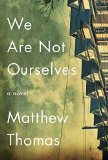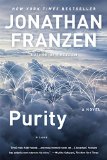Summary | Excerpt | Reading Guide | Reviews | Beyond the book | Read-Alikes | Genres & Themes | Author Bio

Epic in scope, heroic in character, and masterful in prose, We Are Not Ourselves is a multigenerational portrait of the Irish American Leary family.
Born in 1941, Eileen Tumulty is raised by her Irish immigrant parents in Woodside, Queens, in an apartment where the mood swings between heartbreak and hilarity, depending on whether guests are over and how much alcohol has been consumed.
When Eileen meets Ed Leary, a scientist whose bearing is nothing like those of the men she grew up with, she thinks she's found the perfect partner to deliver her to the cosmopolitan world she longs to inhabit. They marry, and Eileen quickly discovers Ed doesn't aspire to the same, ever bigger, stakes in the American Dream.
Eileen encourages her husband to want more: a better job, better friends, a better house, but as years pass it becomes clear that his growing reluctance is part of a deeper psychological shift. An inescapable darkness enters their lives, and Eileen and Ed and their son Connell try desperately to hold together a semblance of the reality they have known, and to preserve, against long odds, an idea they have cherished of the future.
Through the Learys, novelist Matthew Thomas charts the story of the American Century, particularly the promise of domestic bliss and economic prosperity that captured hearts and minds after WWII. The result is a riveting and affecting work of art; one that reminds us that life is more than a tally of victories and defeats, that we live to love and be loved, and that we should tell each other so before the moment slips away.
Epic in scope, heroic in character, masterful in prose, We Are Not Ourselves heralds the arrival of a major new talent in contemporary fiction.
Through the lens of one all-American family, Thomas has crafted a profound meditation on the meaning of success, the joys and challenges of marriage, and the lure (and traps) of the American dream. Eileen Leary, with all her strengths and weaknesses, leaps off the page...continued
Full Review
 (654 words)
(654 words)
(Reviewed by Poornima Apte).
In We Are Not Ourselves, Eileen Leary moves to a three-family home in Jackson Heights in Queens, New York, which, even as she watches, becomes increasingly diverse. "Supposedly it was the most ethnically diverse square mile in the world. Someone more poetically inclined might find inspiration in the polyphony of voices, but she just wanted to be surrounded by people who looked like her family," Matthew Thomas writes about Eileen's subtle racism. Attitudes such as this, many argue, were part of a complex mix of factors that drove white people to the suburbs in the mid-twentieth century.
 A vibrant post-WWII economy meant the expansion of the American dream for the middle class with government-subsidized mortgages readily available to...
A vibrant post-WWII economy meant the expansion of the American dream for the middle class with government-subsidized mortgages readily available to...

If you liked We Are Not Ourselves, try these:

by Ann Patchett
Published 2017
The acclaimed, bestselling author - winner of the PEN/Faulkner Award and the Orange Prize - tells the enthralling story of how an unexpected romantic encounter irrevocably changes two families' lives.

by Jonathan Franzen
Published 2016
A magnum opus for our morally complex times from the author of Freedom
The whole problem with the world is that fools and fanatics are always so certain of themselves, and wiser people ...
Click Here to find out who said this, as well as discovering other famous literary quotes!